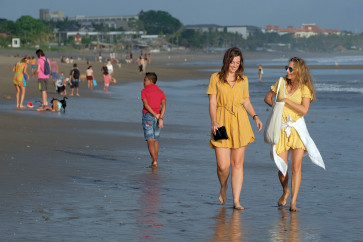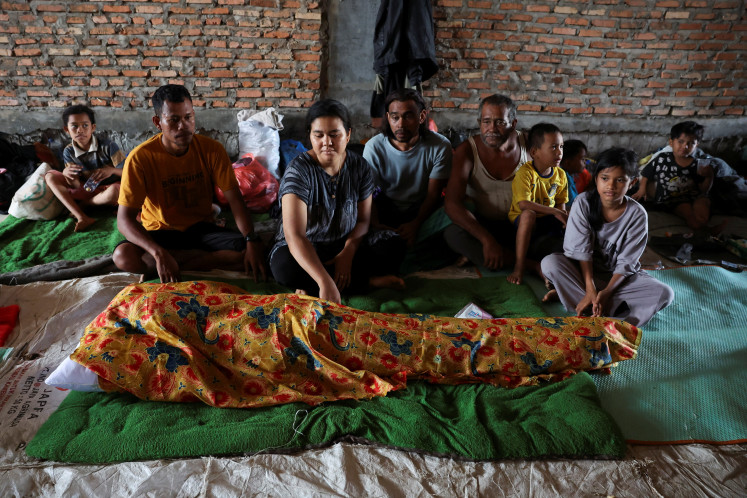Popular Reads
Top Results
Can't find what you're looking for?
View all search resultsPopular Reads
Top Results
Can't find what you're looking for?
View all search results‘Questioning Everything’ Politics Packaged In Pop
All smiles: Authors Tomi Wibisono (left) and Soni Triantoro pose with copies of Questioning Everything: Kreativitas di Dunia yang Tidak Baik-Baik saja at the book’s launch in Yogyakarta
Change text size
Gift Premium Articles
to Anyone
All smiles: Authors Tomi Wibisono (left) and Soni Triantoro pose with copies of Questioning Everything: Kreativitas di Dunia yang Tidak Baik-Baik saja at the book’s launch in Yogyakarta.
Yogyakarta’s Warning magazine presents a wide-ranging collection of interviews exploring the aesthetics and undercurrents of contemporary music, filmmaking and art.
Music interviews can be so formulaic sometimes, it seems that the journalists could be replaced by robots programmed with the same basic list of questions: “What was the inspiration behind your last album?”; “What kind of reception has it received?”, “I heard about [insert funny tour story], what happened there?”; “What are your plans for the future?” Et cetera.
The conversations in Questioning Everything: Kreativitas di Dunia yang Tidak Baik-Baik saja (Questioning Everything: Creativity in a World that Isn’t Okay), a compilation of interviews from Yogyakarta’s Warning magazine, sometimes fall into this familiar pattern, but they just as often veer into more interesting territory.
The magazine — which turned four this year — primarily focuses on music, so naturally bands and musicians occupy the lion’s share of the book.
True to the magazine’s creed of reporting across artistic and national borders, the bands put in the firing line range from Yogya indie favorites FSTVLST and Risky Summerbee & the Honeythief to international punk legends Anti-Flag, Doom and the Buzzcocks.
Fans of the bands will enjoy pouring over the lengthy interviews that were previously cut down on account of the magazine’s space constraints. People such as myself, who aren’t rabid fans of any of the bands, and who are tired of musicians talking about music, and the journalists who facilitate their paint-by-numbers answers, will also appreciate that interviewees are often encouraged to talk about their place in the bigger picture.
Hyper retro glam rockers Sangkakala discuss Indonesian musical and linguistic identity in a day and age where the majority of local bands take their cues from the West, and many sing in English. Sufi popstar cum Renaissance-man Candra Malik talks about the troubled confluence of religion and music, exemplified by the phenomenon of well-known Indonesian musicians putting down their instruments to devote themselves to Islam.
In an interview with Warning editor-in-chief Tomi Wibisonol, he said that injecting social and political issues into music writing was a deliberate tactic to make them more digestible. “We package social and political issues in pop,” he says. While it may not reach the transcendental sociocultural excoriation of the music writing of Lester Bangs, Ellen Willis or Hilton Als, it’s still ahead of the mainstream music journalism pack.
One gets the impression that Warning journalists think critically about their work and subjects, and want their readers to do the same. There’s not a lot of sycophantic “tell me how you’re so great” fanboy groveling here.
Filmmaker Dandhy Laksono is not only asked why he made his political documentary Yang Ketu7uh in a certain way but also why he didn’t make it in a different way, what he left out. The conversation then unfolds into an interesting exploration of the meaning of solidarity and strategies for addressing the structural roots of social issues. The interviews with other filmmakers, Ismail Basbeth, Joshua Oppenheimer and Nia Dinata, are equally engaging.
It is this kind of active, critical interrogation that forces spontaneity and draws something more from the interviewee than the long-ossified spiel that artists tend to deliver after being asked the same thing 100 times.
A personal highlight is the interviews with other journalists and writers. A long discussion with veteran music journalist and Rolling Stone Indonesia editor Wendi Putranto goes on long, interesting tangents about the importance of maintaining independence from one’s subject as a journalist, and the historical and cultural factors that create a culture of critical thinking.
Writer and Mojok.co editor Putut EA gives his two cents on changing media consumption in the internet era. When the Dictaphone is turned on those who would normally be holding it themselves, the mood is like lunch at a media company cafeteria; a group of colleagues who know their field sitting around talking shop.

Book talk: A forum discussion at the book’s launch with authors Tomi Wibisono and Soni Triantoro, Risky from Risky Summerbee and the Honeythief and Kiki Pea from Kiki and the Klan.
Overall, the book strikes an agreeable balance between satisfying fans’ desire to learn about the minutiae of their idols’ career, and discussing the social and political context that gives meaning to their work. The book also serves as an important document of some of the key points on the map of the Indonesian music and arts scene over the last decade.
Although Warning sometimes feels like just a more indie version of Rolling Stone, Questioning Everything indicates that they are beginning to carve out a unique niche for themselves in music journalism; a field that like its subject is often stifled by imitation and formula.










